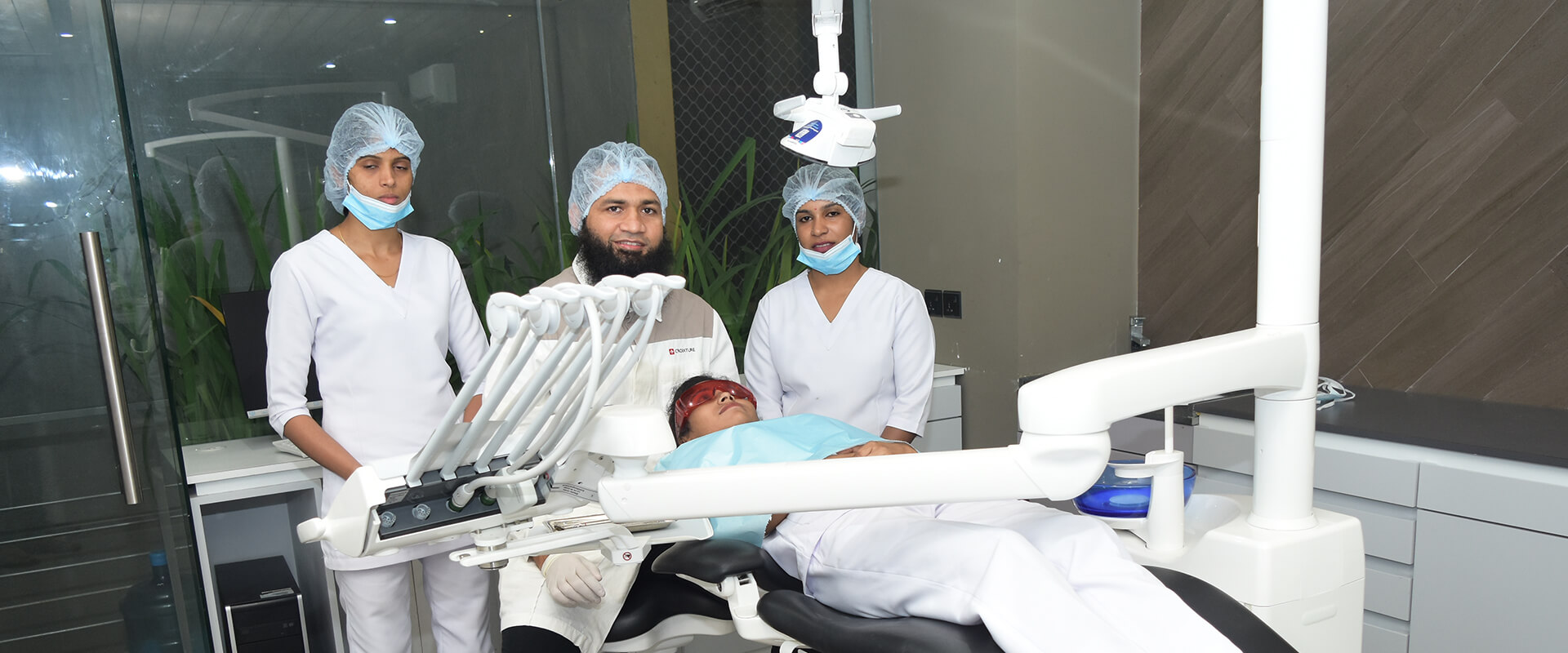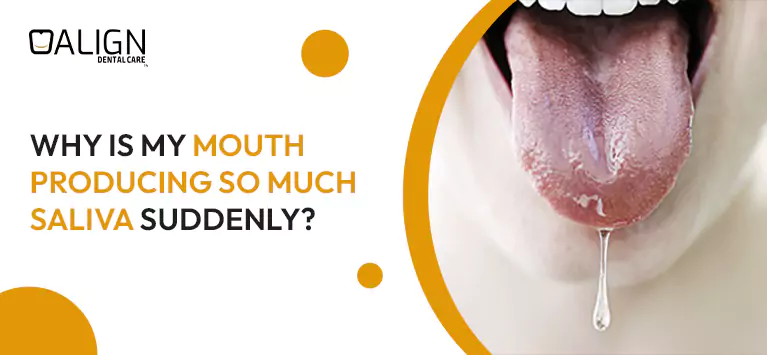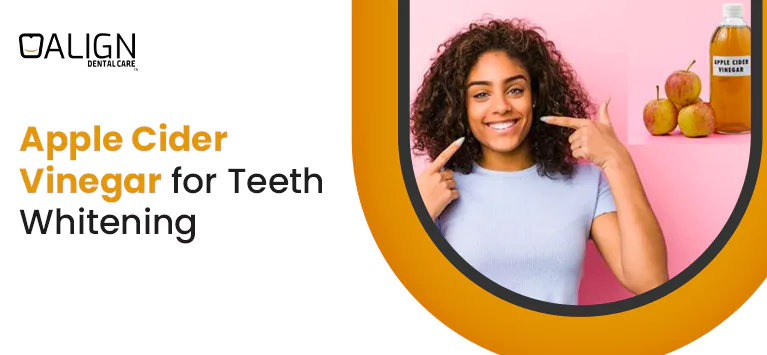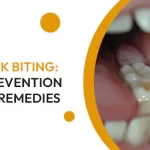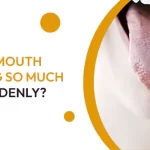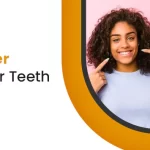Saliva, an essential fluid produced by the salivary glands, plays a crucial role in oral health and digestion. Saliva plays a vital role in oral health, aiding in digestion, maintaining oral hygiene, and protecting the teeth and gums. However, an excessive production of saliva, known medically as sialorrhea, hypersalivation, or excessive salivation, can be a bothersome condition.
What is hypersalivation?
Excessive saliva production, also known as sialorrhea or hypersalivation, is a condition characterized by an overproduction of saliva beyond the body’s normal needs.
Sialorrhea can be a result of various factors, including neurological disorders, medication side effects, oral health issues, or even psychological factors. Hypersalivation occurs when there is an excessive flow of saliva, leading to drooling or the constant need to swallow. This can be not only uncomfortable but also socially distressing for individuals experiencing this condition.
Causes of excessive saliva production
Excessive saliva production can be caused by various factors that range from benign to more serious underlying conditions.
Oral health issues
Oral health issues such as gum disease, mouth infections, or poorly fitting dentures. These conditions can stimulate the salivary glands to produce more saliva as a way to fight off bacteria and maintain oral hygiene.
Medications
Medications such as antipsychotics, antidepressants, and those for Parkinson’s disease may increase saliva production as a side effect. This hypersalivation may cause discomfort or annoyance and requires cautious medication management or dosage adjustments.
Baby teething

In order to relieve the discomfort of their gums while their permanent teeth erupt, babies that are teething produce extra saliva. Their increased salivation is their body’s attempt to reduce pain and facilitate things.
Adverse Drug Reactions
Saliva production may unintentionally be increased as a side effect of several drugs, including those used to treat nausea, psychosis, or epilepsy. For people taking these drugs, this increased salivation could be uncomfortable or inconvenient.
Pregnancy

Hormonal changes in the early stages of pregnancy can increase salivation, which is why excessive drooling is frequently seen in the first trimester. Ptyalism is a symptom that usually goes away as the pregnancy goes on and is sometimes associated with morning sickness.
Dietary habits
Certain dietary habits can also play a role in excessive salivation. Spicy or sour foods, as well as consuming large amounts of food quickly, can trigger the salivary glands to produce more saliva.
Chewing Gum or Candy

The stimulation of saliva glands by chewing gum or sucking on hard sweets results in an increase in saliva production. This helps facilitate digestion and offers short-term relief from dry mouth.
Alcohol and Smoking
Lifestyle choices such as smoking or alcohol consumption can impact salivation. Both smoking and alcohol can irritate the oral tissues, leading to an increase in saliva production as a protective mechanism.
Disorders of the Digestive System

Excess saliva can be a symptom of acid reflux, also known as gastroesophageal reflux disease (GERD), which is the body’s attempt to combat stomach acid in the esophagus.
Neurological disorders
Neurological disorders such as cerebral palsy, stroke, or traumatic brain injury can disrupt the central nervous system’s control over saliva production, resulting in excessive saliva.
Disorders of the Nervous System
Conditions like cerebral palsy, Parkinson’s disease, and stroke affect neural regulation of swallowing and salivation, which causes excess production of saliva. A malfunction in these neural circuits can lead to problems controlling saliva, which can lead to drooling and possible oral health issues.
Psychological factors
Stress and anxiety are known to be linked to hypersalivation. Individuals may feel self-conscious about drooling or spitting excess saliva. This can lead to social anxiety, avoidance of social gatherings, and feelings of isolation or embarrassment.
Allergies and Infections
Increased salivation is the body’s defensive response to allergens clearing the airways, and sinusitis, respiratory infections, etc, trigger it. This overproduction of saliva aids in reducing the discomfort and congestion brought on by these illnesses.
Nausea and Vomiting

Increased salivation is a defensive mechanism to assist neutralise stomach acid when vomiting is anticipated. This extra saliva helps the body protect the throat and mouth from potential harm by acting as a buffer and lubricant to make vomiting easier to pass.
Mouth Breathing
Mouth breathing causes dry mouth by avoiding the nose’s normal filtration and humidification processes. In order to make up for the dehydration, the body responds by producing an excessive amount of saliva, which may be uncomfortable and lead to drooling.
Temperature and Humidity
Excessive sweating in high heat or humidity can cause dehydration, which causes the body to produce more saliva to make up for lost fluid. This increased salivation aids in controlling body temperature and fluid balance by preventing dry mouth and maintaining hydration levels.
By being mindful of these lifestyle factors and making appropriate changes, individuals experiencing excessive salivation can better manage this condition and improve their oral health and comfort.
Summary
In summary, many people find that they are experiencing frustration and discomfort due to excessive saliva production. You can effectively control sialorrhea and hypersalivation and enhance your quality of life by learning the underlying reasons and investigating alternative solutions. To ensure that your treatment plan is customized to meet your unique needs, always remember to seek the advice of a healthcare expert.





